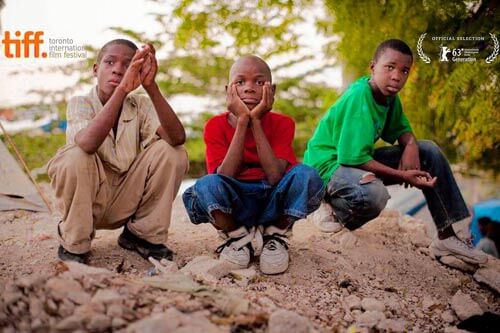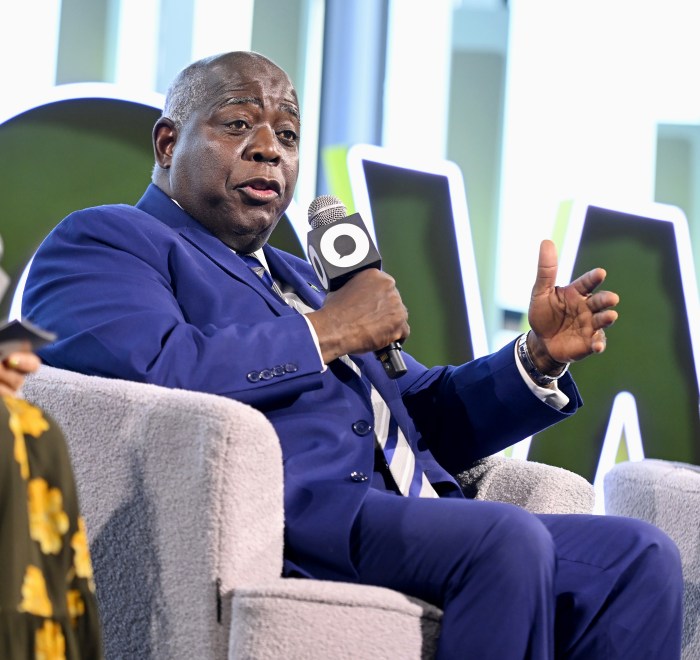The second edition of the Haiti Film Fest produced by Haiti Cultural Exchange will be held May 9-12 in Brooklyn Heights.
During two full days–May 11 and 12, an amazing line-up of films, will be screened free at St. Francis College, 180 Remsen St., noon to 10:00 p.m.
The weekend of screenings will be preceded May 9 by a gala fundraiser featuring Haitian diva Emeline Michel singing from her newly released album and honoring filmmaker and archivist Frantz Voltaire. The kick-off will be at Drom, 85 Ave. A, East Village.
On the evening of May 10 at Five Myles Gallery, film screenings of select shorts can be watched with emerging filmmakers while drinking Haiti’s own Prestige Beer, sponsor for the evening and mixing with industry professionals. For complete festival info: haiticulturalx.org/program-06.
This year’s festival reflects the immense intelligence and efforts of film selection from the 1981 “Anita,” Rassoul Labuchin’s hard-to-find classic, to the 2006 John L’Ecuyer’s infrequently seen narrative, “On the Verge of a Fever/Le Goût des Jeunes Filles”– based on Dany Laferriere’s book of same name, to more recent releases like Guetty Felin’s post-earthquake documentary “Broken Stones.”
A film short precedes the feature films.
Among the NY Premieres at the festival, “Twa Timoun” (Three Children) by Jonas d’Adesky will screen May 11 at 6:00 p.m. The film follows three best friends, (one haunted by memories as a restavek, obsessed by the idea of freedom), all impacted by the earthquake, which throws them into the streets.
Kendy Vérilus’ music documentary “Zafè Fatra” imaginatively tackles an important and rarely addressed issue– Port-au-Prince’s garbage–in the NY Premiere of his eight-minute film at noon, May 11.
This film is paired with “Port-au-Prince, Ma Ville” by Rigoberto Lopez that highlights the capital’s problems along with a focus on its key role in history. The film released in 2000 is also a cinematic archive of a pre-quake Port-au-Prince.
If you missed the narratives “Woch Nan Soley/Stones in the Sun” by Patricia Benoit or Jimmy Jean-Louis starring in “Toussaint Louverture” directed by Philippe Niang at the African Film Fest, here’s a chance to see them. “Woch” screens May 12, 1:00 p.m., and the three-hour “Toussaint” close the festival on May 12.
Following each set of films, a Q&A will take place and most of the filmmakers will be present.
The curatorial team from Haiti Cultural Exchange, co-chairs filmmakers Michele Stevenson and David Belle–also, founder of Cine Institute in Haiti, and an advisory committee of other filmmakers and industry professionals can be credited with this year’s pick of fresh (including the ‘older’ ones) and dynamic films.
Chosen and paired together with much consideration, the feature length films and shorts, documentaries, narratives and experimental films–20 in all, about Haiti or Haitians, made by Haitians, Diaspora, and Internationals offer a strong mixture of settings, issues, and styles.
New York is a film town, but by now, it has dozens and dozens of film festivals. When co-chair Michele Stevenson was asked: Why a Haitian film festival? Hers was a thoughtful response; “The New York area has the largest Haitian community in the country. With the success of HCX’s first festival (in November 2011) it was clear there’s a hunger for images of the Haitian community, for stories in their complexity. It’s important to see ourselves represented in a variety of ways.”
Stevenson reminds us that since the Haiti-on-Screen film festival, (which she and filmmaker Felin organized at NYU in 2004); there have been periodic Haitian film festivals. “Each one has been hugely successful.” Adding, “There are many more filmmakers making films about Haiti since then. Many works by new or young filmmakers are part of this year’s program.”
Stevenson is excited in screening the work from a new generation of filmmakers. A festival of this sort gives a outlet to a receptive audience and “helps support young filmmakers and their vision.” With joy in her voice, she says, “The torch is being passed.”
To this point, some shorts in the festival come from students at Haiti’s only film educational facility, Cine Institute in Jacmel (an outgrowth of the Jakmel Film Festival) and now a regular partner with HCX.
In addition to films coming from Haiti, films also came from filmmakers in the States, Canada and Belgium. Stevenson made special note how there is a strong Diaspora element in the festival.
This year’s program of films is so interesting, varied and substantive that any cinema lover might want to devote a whole day (or two) to the festival. You won’t be disappointed. Film screening schedule: haiticulturalx.org/hcx-haiti-film-fest-2013-schedule.
























